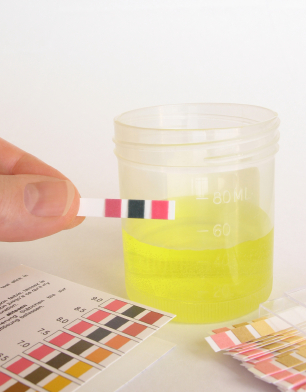Urine pH – Testing Acidity & Alkalinity of our Body
Posted on 20. Jan, 2011 by Staff Writer Candy Del Carmen in Alkaline Diet Tips, Blog
 The term pH (potential of hydrogen) refers to a solution if it is acid, neutral or base/alkaline. Scientifically speaking, pH is the amount of hydrogen ions available in a particular solution. Therefore, any solutions can be either acidic H+ions, or it can be alkaline Hydroxyl OH-ions. Using the scale of 0-14, with pH 7 as neutral, the lower number is considered as acidic and the higher scale indicates alkalinity. What does it imply in human body?
The term pH (potential of hydrogen) refers to a solution if it is acid, neutral or base/alkaline. Scientifically speaking, pH is the amount of hydrogen ions available in a particular solution. Therefore, any solutions can be either acidic H+ions, or it can be alkaline Hydroxyl OH-ions. Using the scale of 0-14, with pH 7 as neutral, the lower number is considered as acidic and the higher scale indicates alkalinity. What does it imply in human body?
Ideally, human blood has to maintain 7.35 pH and once it moves below the range of 7.38 or increases in 7.8 pH, our cells begin to stop from functioning resulting from chronic diseases or death. Aside from the blood, other cells and tissues has to be slightly alkaline in order for our body to function well. There are two ways in which you can check the acid alkalinity of your system. First is through urine test, and the other one is through conducting saliva test. Nevertheless, this article will focus on the urine pH and talks about the significance of the trial in monitoring health.
What is urine pH?
As we understand, our body’s pH level has to maintain its ideal range as it can move to being acid or alkaline. If you want to classify your urine as either base solution or acid, urine ph is commonly used with the pH strips.
Urine pH is performed to test the changes in the body’s acid levels. Due to many health problems, we are required to daily monitor our general condition. The availability of urine pH test kits in the market can improve the lives of people who are keen on their health status as special pH paper can check the acidity and alkalinity in your system.
With all the health parameters, the pH of urine must me 6.4 in average, based on the researched conducted by Dr. Carey Reams. The principles claimed that it seems to be the ideal range because of the specific ionizations that we carried out in our body.
Preparation for the Test
If you are currently taking any medication, kindly consult your doctor if you can stop certain drugs that may directly affect the results of the urine test. Drugs such as potassium citrate, sodium bicarbonate, and acetazolamide can increase urine pH. On the other hand, drugs including ammonium chloride, methenamine mandelate, and thiazide diuretics may decrease the urine pH.
Just eat a normal and balanced diet before you take the urine pH. Two hours after a meal is the best time to conduct the urine pH. It is a given fact that every food we ingest in our mouth triggers our pH level that may fluctuate from time to time. Therefore, to check the consistency of your urine pH, make a pH log and record the result. Include on your log what you have eaten, the result of urine pH and your state of health condition or how you are feeling. By doing so, you may know what certain foods that affect your pH level and make necessary adjustments on your eating habits.
Take note that it may also depend on the person’s status of acid-base the result of their urine pH because for some people, they actually range from 4.6-8, and this is still in normal value as checked by their doctors.
Other Health Reasons for taking Urine pH
In clinical test, urine pH is done in patients who are at risk for kidney stones. It is our kidneys that maintain the normal acid-balance through the process of re-absorption of the sodium and tubular discharge of ammonium ions and hydrogen. The secretion of alkaline or acid urine through kidney is the most essential mechanisms our body uses in order to maintain a constant body pH level. Urine only becomes acidic because of the amount of excess acid stored and the amount of sodium. On the other hand, the alkaline urine contains bicarbonate-carbonic acid buffer and is excreted if there is an alkali excess in the body.
There are also physical and medical conditions wherein highly acidic urine occurs such as the following:
1. Acidosis
Acidosis is the condition of excessive acid in the blood fluids. It usually occurs when a person lost the alkalinity reserves and there is already an acid build up in the tissues and cells. In cases of acidosis, the pH level of the blood becomes low.
2. Uncontrolled diabetes
For diabetic people, the glucose in the blood is normally filtered through the kidneys which returned to the blood stream. It is when the blood glucose is elevated that excessive glucose appears in the urine, making it acidic.
3. Diarrhea
Loss of bases or alkalinity of the body can be caused by diarrhea. It is a weakening condition due to frequency of bowel movement in the form of stool. Also, there are number of people suffered from acid reflux who are also complaining for diarrhea. As medical sources noted, acid reflux can occur in the lower-stomach muscles which are involuntarily relaxed causing the diarrhea and irritable bowel syndrome.
4. Dehydration and starvation can also caused the acidity of urine pH due to excessive loss of body fluid and the alkaline reserves.
5. Respiratory disease is another factor wherein the carbon dioxide retention may occur and acidosis may develop.
It is not a good perspective to have high urine pH so people have to look for healthy ways to restore the lost pH balance. For those people who love to eat meat and fewer vegetables, urine tends to be very acidic. It is worth remembering an alkaline diet rich in citrus fruits, vegetables in their meals, and legumes can raise he pH level and can produce more alkaline urine. Likewise, when you control your pH through proper diet and nutrition, you can manage several diseases and control the harmful bacteria causing the urinary tract infections. It is always good to remember that maintaining adequate alkaline reserves through alkaline diet can meet any emergency demands against serious illnesses.





Recent Comments